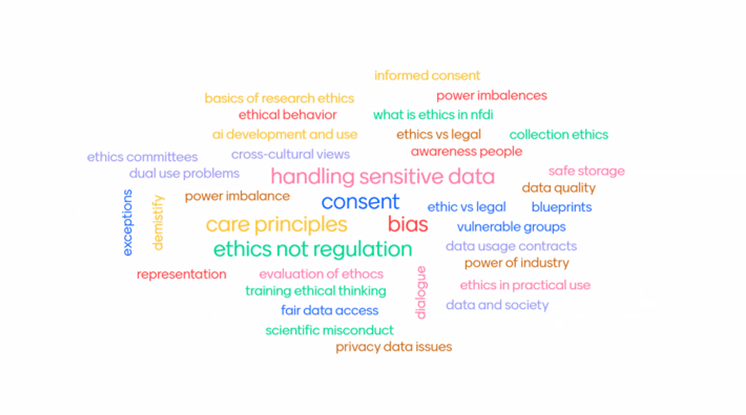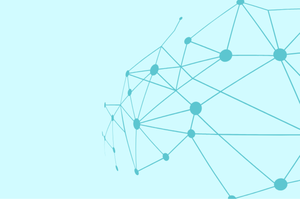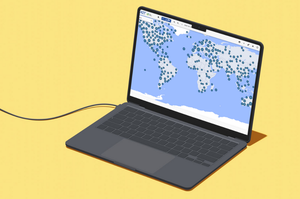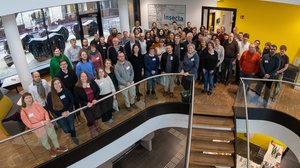Finding the E in ELSA: Kick-off for the Ethics Task Force

Research data are not only valuable resources for scientific knowledge and political action, but also sensitive information that raises ethical, legal and social questions. For example, data breaches, unconscious bias in data collection or analysis, and insufficient transparency about the origin and use of data can jeopardize the integrity and credibility of research findings.
Given the multiple challenges and potential risks associated with the use of research data, it is essential to establish a clear framework that sets standards and best practices. While the ELSA Section (ethical, legal and social aspects) currently only has a data protection task force that deals with legal aspects, there is also an urgent need for a working group explicitly dedicated to ethical issues. The workshop "Exploring Ethical Challenges across the NFDI", which took place on February 28, 2023, therefore not only marked the start of a more intensive examination of ethical issues, but also served as an impetus for the establishment of an ethics task force within the NFDI. Representatives from the various consortia, including NFDI4Biodiversity, discussed the specific challenges facing their communities and discussed overarching ethical issues and goals.
Priorities and discussions of the consortia
The workshop was preceded by a survey on ethical issues. This provided an opportunity for the Section members to contribute their perspectives and help capture the diverse ethical challenges faced by the various NFDI consortia. A summary of the key issues was presented at the workshop, which will serve as a basis for the future work of the Task Force. Following on from these priorities, effective strategies for tackling the fundamental issues and concrete measures to promote research data management will be developed:
- How can consortia such as NFDI4Health and 4Microbiota, which are entrusted with the management of patient data, ensure that patients are actively involved in research and understand what happens to their data and what they consent to, while ensuring that their data is not misused?
- Which historical records should be accessible to the public and which should be restricted, for example to protect privacy or out of respect for cultural sensitivity?
- How can different institutions work together to use research data responsibly?
- How can we prevent open data from being misused for harmful purposes?
- How can research data plans help to ensure that science remains fair and transparent?
- How can we ensure that ethical principles are integrated into the management of sensitive data and ensure that all stakeholders are treated fairly?
- What rules should apply to the use of AI in science and how can we ensure that it remains fair and transparent?
- How can we ensure that global power imbalances are taken into account when collecting and processing data?
- What responsibility do we have when dealing with "dark data"?
- How can we responsibly collect and use data from social media or digital behavior?
Impulse talks
The impulse talks during the workshop highlighted various ethical challenges in the research data infrastructure in more detail, allowing an individual perspective of individual consortia and their focus areas:
Andreas Bruns from the BERD@NFDI consortium spoke about how it is crucial to obtain the consent of the people whose data we want to use, especially in the field of health research. He emphasized that it is not only about obtaining consent, but also about ensuring that patients are actively involved in decisions about the use of their data.
Ulrich Sax from the NFDI4Health consortium posed the question of whether it is ethically justifiable to link different data sets in order to achieve better research results. He emphasized that we must ensure that the protection of privacy and respect for patients' rights are not compromised.
Jan Krasni, an expert in media ethics from the Technical University (TU) Berlin, showed us the challenges associated with the digitization of materials that contain hate or discrimination. He emphasized the importance of respecting the dignity of victims and developing ethical principles that apply to all situations, regardless of the specific circumstances.
The question of who the task force is aimed at was raised afterwards. Should it be aimed at researchers, politicians, non-governmental organizations or other stakeholders? The consensus was that this question is still open at the moment and will remain so for the time being. In principle, there should be the possibility for various forms of cooperation, both with institutions and with other groups. However, it was emphasized that the task force would primarily like to address the NFDI community.
Outlook
As an integral part of the NFDI, the ELSA section plays a crucial role in ensuring transparency and trust in our handling of research data. The integration of ELSA principles into our work underpins the development of a sustainable and responsible research data infrastructure that not only promotes scientific excellence, but also meets the needs of society. These core values of integrity, fairness and responsibility form the foundation for our efforts to strengthen trust in the research community and create a sustainable knowledge base for future generations. During the workshop, it became clear that the Ethics Task Force wants to set clear goals and potential outcomes to concretize this approach. The discussions showed that the work will mainly focus on the development of guidelines to set out the values of principled research data management. The production of scientific papers, workshops, training networks and community building were also considered to ensure a comprehensive and sustainable integration of these values into our activities.
The first official meeting of the Ethics Task Force is scheduled for March 21. This will be an important opportunity to continue the discussions from the workshop and plan concrete steps to achieve the desired goals. It will be interesting to see how the work of the task force will develop in the coming months and what contribution it will make to the further development of ethical standards and practices in the cross-cutting topics of the NFDI. The NFDI4Biodiversity consortium will continue to monitor the task force process and report on progress.
Please enter your Mastodon instance








